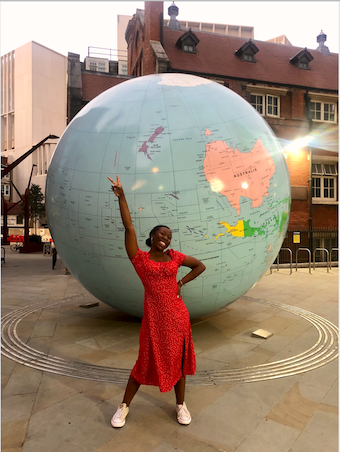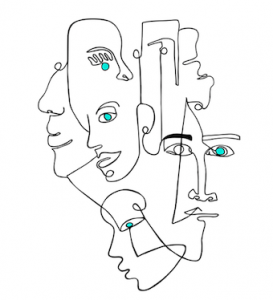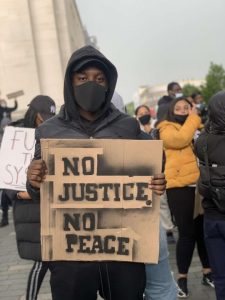
Two weeks ago I sighed a breath of release when I submitted my masters dissertation for my course in International Social and Public Policy. For some time afterwards, my muscles were still tensed in the memory of the fight they had just endured. It took a while for me to unclench enough to actually reflect on what had just happened. However, as soon as I had returned to a normal state I knew this was a piece I had to write.
My dissertation meant an incredible amount to me. Not just in the sense that it was something I worked hard on, which is true for everyone, but also in the sense that this masters was an opportunity I gripped with both hands. This dissertation was more than a compulsory submission, it was the expression of a message that I had been trying to swallow for the entirety of my academic career. Studying law and then policy, the limitation of existing policy initiatives in regards to Black liberation had become fairly clear to me. Despite the positive intentions of thinkers and actors within formal institutions, we have been dealing with symptoms of inequality and not the cause. We attempt to address inequalities in housing, education, healthcare, sport, without adequately interrogating the recurrence of similar themes and the root causes for these outcomes. Then, when the results of symptom-reactive policies lead to more of the same we look around at one another in disbelief.
Of course, this ‘revelation’ is not necessarily that new in terms of radical liberatory discourse. Ultimately the belief that we have to fundamentally uproot anti-Black value systems is core to the philosophy of decolonising. It is this concept that distinguishes equality, diversity and inclusion models from decolonising. While this is a topic that has been discussed for at least 150 years, within academic teaching in policy and Law it still seems an enigma. Thus, against the advice of my academic mentors, advisors and seniors I chose to persist with a question I was proud to confront: ‘How far can the Equality Act 2010 be considered a ‘radical’ Act contributing to Black liberation and recognition in Britain?’
Much of the discouragement about this question came from a good place. ‘Play the game, Maxine’. ‘Write freely in your blog and use narrower topics for academic submissions’. Out of respect for these advisors I really did try. I shrunk my question and tried to shrink my passion to fit neatly into this 10,000 word document. However, finding myself curled into foetal position on my brother’s sofa a week later, I realised this approach was not working for me. After finding myself in this uncharacteristically low place, I decided to stick with my original question.
Of course by this point I was behind on time and had a lot to prove. Not only did I need to ensure this piece would be graded well by those who did not accept the premise of Black liberatory thought. I now also had to convince those who had loved me enough to ask me to choose an easier topic that this was a sentiment worth expressing. It is in these moments of isolation that God is found.
As a child, there was a woman in our community who used to say “we serve a God of suddenly”. Well, Aunty Hannah, you are right. I thank God for the way he suddenly inspired my mind, my thoughts and my hands, which could barely keep up with the zing that convulsed through me. I read and wrote and read and wrote until I had a piece I was deeply proud of. Feeling that instinctual flow of inspiration, I knew that people had prayed for me to be exactly where I was in that moment. In the words of my dear Chance the Rapper, which I was reminded of in his film Magnificent Colouring World, “I am the thesis of [their] prayers”.
I am the thesis of their prayers
Chance the Rapper
Being acutely aware that my dissertation was about more than myself, it was essential to integrate different voices. As part of my drafting process, I held a round table. The idea of this short virtual event was to bring together some of the thinkers, social justice activists, and influences that have impacted my outlook on Black liberation with a focus on Britain. I presented my key questions and waited for their responses. From there I posed some of my own findings which they were able to endorse or counter depending on how robust they perceived the ideas to be. The purpose of this event was to broaden my thinking beyond myself, to make myself vulnerable in the practice of research and be reminded of the purpose of a question such as this.
Having now submitted this piece, I feel strongly that it would be unacceptable for the life of this piece to end here. My dissertation asks the challenging question of how we can achieve Black liberation in the birthplace of anti-Blackness. The answer to this question fundamentally belongs to my community. Hopefully, at least one reader will perceive enough value that they will help me to publish this somewhere it can reach more people. Additionally, I wish to present my research in an interactive event that is open to the public. It is for this reason I have not directly copy and pasted my entire dissertation onto my website. However, if you are still reading, I would ask you to keep your eyes peeled because I would love to hear your thoughts too. An invite is on its way to you. This research cannot and should not belong to me alone. In fact, responses to this piece are as important as – or even a constitutive part of – the research itself.
I knew in my heart that finishing this course required more than a conventional social media post, not least because this qualification belongs to so many people in addition to me. It belongs to my Mum, who knew before I did that I was capable of undertaking any masters I set my mind to. It belongs to my brother, Brandon, and my Dad, who told me to apply to the best institutions because they would want me as much as I would want them. It belongs to my friend, Zec, who helped me to conceptualise and film a video to fundraise enough money to undertake the course. It also belongs to the 137+ people who donated towards my masters GoFundMe, the Black Heart Foundation, Geoff Taylor Trust and Chapman Educational Foundation who financially enabled me to take the leap of faith. It belongs to those who answered the phone to me when I was constructing ideas or feeling overwhelmed by the intensity of the course. It belongs to the friends who held me, encouraged me, bought me food, and threw me surprise parties to celebrate my milestones. It belongs to the LSE lecturers who spared well beyond their allocated advice and feedback slots to support my thinking and encourage me. I thank all of these people and the additional names which should be listed here. You know who you are. A blog post does not cover the extent to which I value your investment in my life. But I hope this little piece of my heart is a start.
A key reason my dissertation submission – and this blog post – meant so much to me is because they also represent the conclusion of my time studying in London. This great city has been the centre of my life for the past 5 years and moving away feels like the conclusion of a chapter. I am so grateful to London for the way she has taught me, loved me, expanded my horizons and helped me to dream. London will always hold a fantastically important position in my life. The need to say goodbye to her led to me take a walk from Tower Bridge, where I was having dinner with a friend, past Southbank where I used to revise for my undergraduate exams, towards LSE, where I kindly asked some intoxicated strangers to take obligatory ‘end of course’ pictures with me. The picture associated with this post was taken on the journey of that last cathartic walk.
Though this stream of consciousness feels as though it could go on, I am rounding off with a reminder that academia is supposed to expand us as thinkers. The academy is supposed to be a site of innovation, risk taking, groundbreaking revelations. This takes work and also vulnerability. I am proud of myself for taking the risk of submitting a piece of research that felt more like the fulfilment of purpose than playing the academic game. For those of us who are still navigating these complex environments, particularly as Black people, fight on. We are one leg of a relay race that begun long before us. Our thoughts, dreams, and voices are important. We get to choose how we use them.



viagra in women Rosuvastatin Generic Crestor 10 MG 30 Tablets